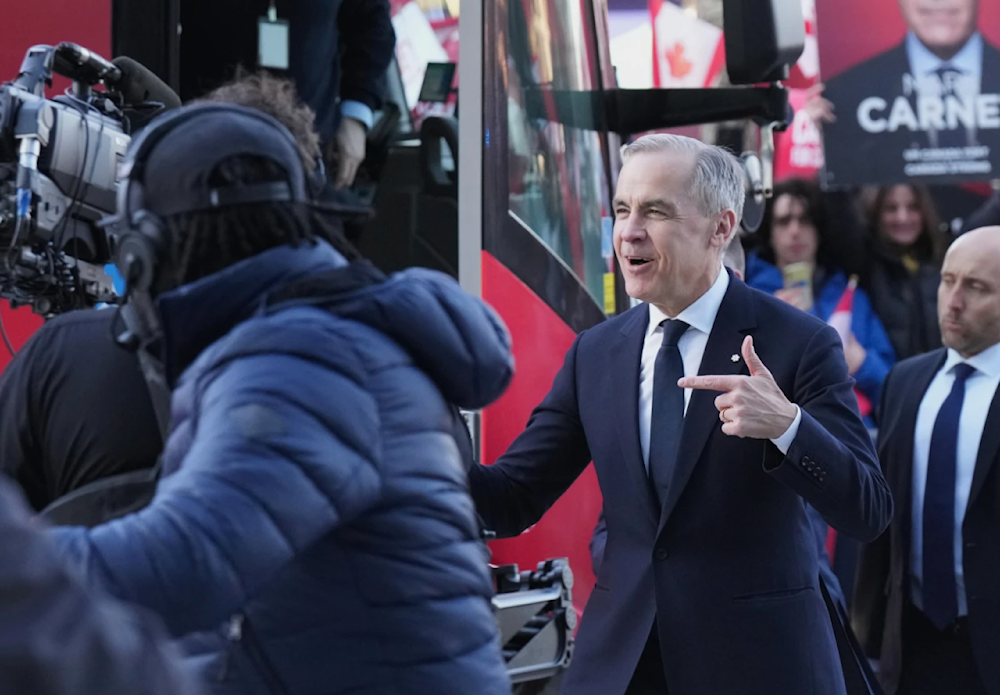Mark Carney outlines strategy to 'Trump-proof' Canada: Politico
The Liberals say their program aims at preserving Canada's sovereignty and culture from the US, as well as Trump's "unjustified trade war," which Carney saw as an attempt to harm Canada.
-
 Canada's Prime Minister and Liberal Leader Mark Carney arrives for the English-language federal election debate in Montreal on April 17, 2025 (AP)
Canada's Prime Minister and Liberal Leader Mark Carney arrives for the English-language federal election debate in Montreal on April 17, 2025 (AP)
Canadian Prime Minister Mark Carney unveiled his election plan on Saturday, emphasizing greater military investment and defending Canada from US President Donald Trump's expansionist ambition.
In a Saturday address in East Toronto, Carney expressed, “In this crisis we have to prepare for America’s threats to our very sovereignty. They want our land, our resources, they want our water, they want our country."
“President Trump is trying to break us so that America can own us, and that will never happen. Canada is not America, and it never will be, but we need to do more to just recognize that. We need a plan to deal with this new reality.”
If elected, Carney's Liberal government plans to spend C$30.9 billion on the military over four years, aiming to meet NATO’s 2% GDP defense target by 2030—two years ahead of schedule—with a focus on strengthening Canada's Arctic region to counter growing Chinese influence, according to POLITICO.
“The North faces existential threats as countries try to take advantage of new shipping routes opened by climate change, exploit our critical minerals, and encroach on our borders,” the plan emphasizes, which vows to “keep Canada strong, free, and sovereign.”
Three-part defense spending strategy
Canada’s defense spending plan would include three parts.
The first focuses on strengthening personnel by recruiting new members, increasing pay for military staff, and building new housing on bases.
The second tranche funds new equipment for troops, including self-propelled artillery, ground-based air defense systems, and early-warning radar (in collaboration with Australia), to enhance operational readiness at home and abroad.
The third invests in cutting-edge technologies like quantum computing and AI to support military innovation in autonomous systems, strategic simulations, and intelligence analysis.
POLITICO noted that half of the total spending is dedicated to major new hardware—like submarines, icebreakers, and drones—to bolster Arctic defense and counter potential threats from Russia and China.
Canrey's Liberals stated that it will collaborate with Indigenous partners on infrastructure, as well as create towns and energy projects in the North, to make the Arctic a desirable location to live and work. Carney also pledged to collaborate with Europe on Arctic security.
Conservatives propose competing defense strategy
His primary political adversary, Conservative Leader Pierre Poilievre, has similarly vowed to prioritize defense if he wins the election on April 28.
Canada’s Conservative Party unveiled plans to upgrade the North American Aerospace Defense Command (NORAD), establish a permanent Arctic military base in Iqaluit, and rebuild a base in Inuvik to enable “quick interceptions of Russian and Chinese incursions," while emphasizing national sovereignty and military self-determination amid US pressure to increase defense spending.
The Liberals stated that their program was aimed at preserving Canada's sovereignty and culture from the US, as well as Trump's "unjustified trade war," which Carney saw as an attempt to harm Canada.
“America’s unjustified and reckless trade war threatens Canadian jobs, businesses, and our way of life. ... In the face of this threat, we have a plan to build the strongest economy in the G7,” Carney stated.
Economic strategy to offset US tariffs
The plan also focuses on breaking down trade barriers between Canada's provinces to help offset Trump's tariffs, supporting the country's agriculture sector, which is caught in the middle of a trade war with the United States and China, and expanding the auto industry's supply chain in Ontario, where 500,000 jobs are at risk.
The Liberals also intend to establish new business links with Europe and Asia, as well as with MERCOSUR, the South American regional economic integration bloc, and ASEAN, a regional organization of ten Southeast Asian nations.
While Carney intends to increase defense spending, he also stated that a Liberal government would reduce spending, primarily in the federal public service and through the use of consultants, in order to balance the operating budget by 2028, while promising to protect services such as health care, pensions, and employment insurance.
Carney also promised to use Canada's G7 leadership to promote Canadian principles on a global scale, "including working to protect the rules-based international order from those who want to destroy it."

 4 Min Read
4 Min Read








